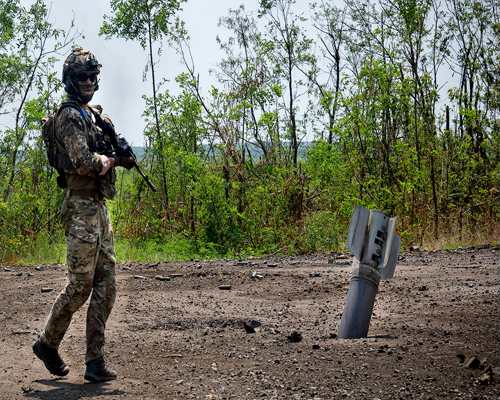As the death toll from the Ukrainian counteroffensive mounts, it becomes apparent why some soldiers and observers are beginning to wonder whether a major victory could be in the offing or whether Russian defense lines, which have been significantly strengthened over the winter months, are finally a rather insurmountable obstacle.
The BBC’s Andrew Hardinge, who spent the last few weeks in different parts of the front line and spoke to a number of people, says that their views and assessments of the future of the Ukrainian counter-offensive could be put into three categories.
In particular, there are those who consider Russia’s defense lines to be ‘tin’, while some describe them as ‘wooden, and others see them as ‘glass’.
The “chigo” theory
As Harding mentions in his article, the theory of “tin” lines of defense—that is, malleable yet durable—was explained to him by a jaded doctor he met at a hospital near Bahamut.
Under the sound of artillery fire, the doctor spoke about the mounting losses on the Ukrainian side, even pointing out that Russia had a long time to prepare and had a large number of soldiers.
He concluded that while Ukraine could force Russian front-line forces to retreat perhaps tens of kilometers, it would be very difficult to achieve more than minimal blows to Russia’s strategic control of eastern and southern Ukraine.
“I believe that the solution to this war is not in the field. It will be terminated by political agreement,” the doctor told Harding.
The “wood” theory
The theory of Russia’s “wooden” defense lines, which are more likely to break or show “cracks,” began to take shape in Harding’s mind while he was about three hours away from Bakhmut, outside the small town of Velika Novosilka.
In the fields and hills stretching to the Black Sea, Ukrainian forces pushed forward, finding ways to break through minefields and attack Russian positions from unexpected angles. Somehow, they managed, slowly but surely, to recover important pieces of land as well as several villages and small towns.
“I’m a realist, although some people call me a pessimist,” 36-year-old Ukrainian soldier Artem told the BBC as a Ukrainian jet streaked across the sky. He argued that the morale of Russian troops is low and that Ukraine is likely to score some major victories in the coming months. But he doesn’t think the counterattack will lead to the crushing of the Russians, as it did for a brief period last November.
According to Harding, it is worth noting the fact that the most pessimistic assessments of the Ukrainian counterattack are expressed by soldiers who are closer to the front lines and more directly involved in the fighting.
One could say that these soldiers have the most experience and the most realistic views, writes Harding. But it should be noted that they are also those who have the least ability to give the overall picture that prevails, committed as they are to smaller parts of a huge military operation, explains the BBC journalist.
The “glass” theory
Finally, there is the theory of “glass” lines of defense, whose exponents are prominent Western analysts such as Mick Ryan and generals such as the head of the British armed forces, Sir Tony Radakin.
According to that theory, the counterattack is being planned, and in a few weeks or months, Russia’s defenses will crumble, allowing Ukraine to seize significant territory and advance closer to (if not into) the Crimean peninsula.
Proponents of this theory recommend patience rather than pessimism, arguing that Ukraine’s lack of air power means it cannot accomplish its vital task of destroying the Russians’ “operating system—that is, their supply lines and the command centers—as quickly as they would like.
Instead, Ukrainian forces are using surface-to-surface missiles to achieve this goal while at the same time attacking Russian positions in as many places as possible in order to inflict the greatest possible damage on enemy forces and equipment.
“Everyone is expecting an important victory. We have faith, and we wait,” says a Ukrainian doctor named Yevhen, whose view, according to Harding, sums up the optimistic mood that prevails among most Ukrainian soldiers and officials. “We know everything will be fine. We just have to be patient,” he said, smiling under the sunlight to the sound of artillery.
Source: BBC

